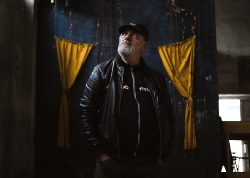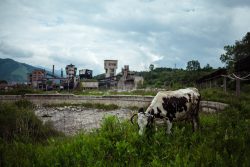03 December 2018
Citizens Beyond Coal – Ion Barbu, Romania
 It was all grey. Grey hills, grey houses, grey forest. Grey silhouettes walking back and forth between the dark skeletons of the mining structures and the sad, greyish apartment buildings. Even the river was black – waters saturated with thin coal powder.
It was all grey. Grey hills, grey houses, grey forest. Grey silhouettes walking back and forth between the dark skeletons of the mining structures and the sad, greyish apartment buildings. Even the river was black – waters saturated with thin coal powder.
And, yet, people in the Jiu Valley in south-western Romania remember the times, before 1989, when the coal mines were working as good. As grey as it was, the valley was very much alive.
More than 100,000 people were working around the clock to support an economy based on coal, and they were rewarded with high wages and praised as heroes by the communist propaganda. At a time when others in the country were suffering from food shortages, the miners had everything they could possibly need. The mines even had their own libraries, clubs and cinemas.
 People moving in from other regions were hired as soon as they got off the train, directly at the railway station. More than 4,000 people were employed by just one mine, the oldest in the valley: Petrila. When the mine shut down, in 2015, only 400 were still working in the decaying, half-demolished buildings.
People moving in from other regions were hired as soon as they got off the train, directly at the railway station. More than 4,000 people were employed by just one mine, the oldest in the valley: Petrila. When the mine shut down, in 2015, only 400 were still working in the decaying, half-demolished buildings.
Many left the area after the massive layoffs between 1997 and 1999. Most of them went to work in western Europe and started sending money back to their relatives in the valley. Some even returned to start small businesses of their own in the valley – mostly shops and chalets.
This trickle of money and energy offered some hope, but it was not enough. Surrounded by hills and virgin forests, and with a few small but ambitious ski resorts in the nearby mountains, the valley has more and more started to place its bets on tourism. It has to face one big challenge though: it is remote from all densely populated areas in the country and the region hasn’t been seen to be sufficiently alluring to entice people to make the effort to go there.
That was until a group of determined locals started to challenge the perception that the place has nothing extraordinary to offer.
Ion Barbu was born and lives in Petrila. Now in his 60s, he is an acclaimed, prolific and internationally awarded artist who combines drawing, painting and graphic writing to produce a variety of work, from installations to murals and urban art. In the early 2000s, as he became aware of the demise of the mining industry, he thought of a way to infuse his community with new life: by using his best weapon, art.
 “This town was a cultural desert,” says Ion Barbu. “So I said to myself: let’s create a few islands in this desert. If we want to see a play or hear some music, why not bring them here instead of us going to the city?”
“This town was a cultural desert,” says Ion Barbu. “So I said to myself: let’s create a few islands in this desert. If we want to see a play or hear some music, why not bring them here instead of us going to the city?”
At the beginning, almost everyone saw Barbu as either a crazy eccentric or a dangerous cultural anarchist.
In 2006, as the Romanian city Sibiu was preparing to become the European Capital of Culture, Barbu launched a series of cultural events in Petrila under the brand ‘the European Periphery of Culture’. He organised in Petrila a now annual arts and music festival called ‘Bad Man’, a pun on the name of a well-known national folk festival ‘Good Man’.
Together with a few volunteers, he restored the memorial house of I.D. Sarbu, an important Romanian writer born in Petrila who had been imprisoned during the communist regime. He transformed a pedestrian crossing on the main street in Petrila into a piano keyboard, and painted the grey facade of an apartment building as a pink, giant postal envelope – a reference to the exodus of Romanians to western Europe (around 4 million Romanians now live abroad).
Gradually, more artists and volunteers began to share Barbu’s vision and help him. The local administration was already exasperated, and this was only the beginning.
After a long battle, which started with Ion Barbu’s first provoking artworks, the town hall officials are finally starting to share his vision.
“Now we just need them to officially request our help to raise the money to buy the plant, and we’ll put all our efforts into that,” says Barbu, his inspiration burning bright and determinedly.
Read the full story on just-transition.info
Text and images: Adrian Catu
